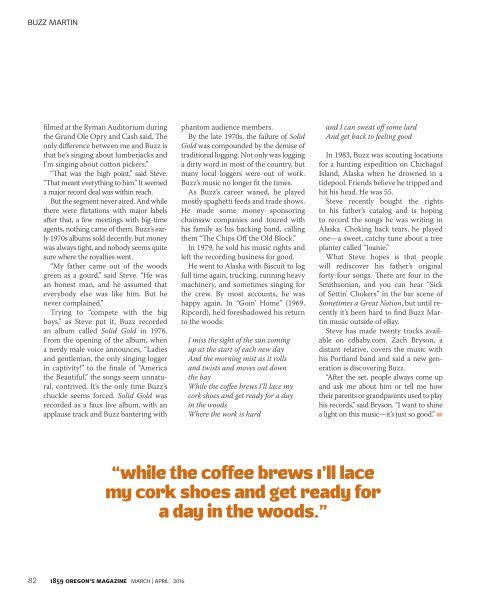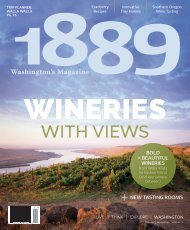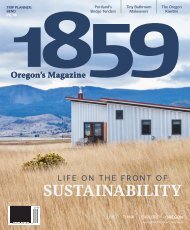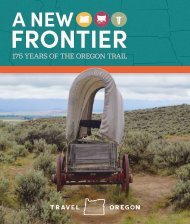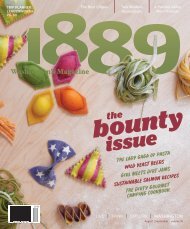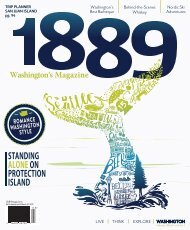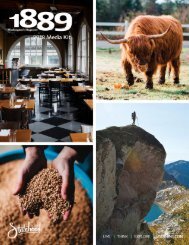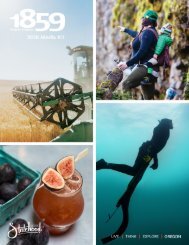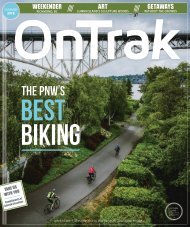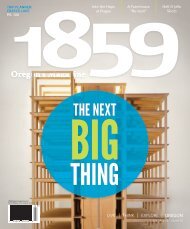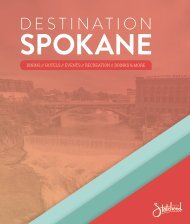You also want an ePaper? Increase the reach of your titles
YUMPU automatically turns print PDFs into web optimized ePapers that Google loves.
BUZZ MARTIN<br />
filmed at the Ryman Auditorium during<br />
the Grand Ole Opry and Cash said, The<br />
only difference between me and Buzz is<br />
that he’s singing about lumberjacks and<br />
I’m singing about cotton pickers.”<br />
“That was the high point,” said Steve.<br />
“That meant everything to him.” It seemed<br />
a major record deal was within reach.<br />
But the segment never aired. And while<br />
there were flirtations with major labels<br />
after that, a few meetings with big-time<br />
agents, nothing came of them. Buzz’s early<br />
1970s albums sold decently, but money<br />
was always tight, and nobody seems quite<br />
sure where the royalties went.<br />
“My father came out of the woods<br />
green as a gourd,” said Steve. “He was<br />
an honest man, and he assumed that<br />
everybody else was like him. But he<br />
never complained.”<br />
Trying to “compete with the big<br />
boys,” as Steve put it, Buzz recorded<br />
an album called Solid Gold in 1976.<br />
From the opening of the album, when<br />
a nerdy male voice announces, “Ladies<br />
and gentleman, the only singing logger<br />
in captivity!” to the finale of “America<br />
the Beautiful,” the songs seem unnatural,<br />
contrived. It’s the only time Buzz’s<br />
chuckle seems forced. Solid Gold was<br />
recorded as a faux live album, with an<br />
applause track and Buzz bantering with<br />
phantom audience members.<br />
By the late 1970s, the failure of Solid<br />
Gold was compounded by the demise of<br />
traditional logging. Not only was logging<br />
a dirty word in most of the country, but<br />
many local loggers were out of work.<br />
Buzz’s music no longer fit the times.<br />
As Buzz’s career waned, he played<br />
mostly spaghetti feeds and trade shows.<br />
He made some money sponsoring<br />
chainsaw companies and toured with<br />
his family as his backing band, calling<br />
them “The Chips Off the Old Block.”<br />
In 1979, he sold his music rights and<br />
left the recording business for good.<br />
He went to Alaska with Biscuit to log<br />
full time again, trucking, running heavy<br />
machinery, and sometimes singing for<br />
the crew. By most accounts, he was<br />
happy again. In “Goin’ Home” (1969,<br />
Ripcord), he’d foreshadowed his return<br />
to the woods:<br />
I miss the sight of the sun coming<br />
up at the start of each new day<br />
And the morning mist as it rolls<br />
and twists and moves out down<br />
the bay<br />
While the coffee brews I’ll lace my<br />
cork shoes and get ready for a day<br />
in the woods<br />
Where the work is hard<br />
and I can sweat off some lard<br />
And get back to feeling good<br />
In 1983, Buzz was scouting locations<br />
for a hunting expedition on Chichagof<br />
Island, Alaska when he drowned in a<br />
tidepool. Friends believe he tripped and<br />
hit his head. He was 55.<br />
Steve recently bought the rights<br />
to his father’s catalog and is hoping<br />
to record the songs he was writing in<br />
Alaska. Choking back tears, he played<br />
one—a sweet, catchy tune about a tree<br />
planter called “Joanie.”<br />
What Steve hopes is that people<br />
will rediscover his father’s original<br />
forty-four songs. There are four in the<br />
Smithsonian, and you can hear “Sick<br />
of Settin’ Chokers” in the bar scene of<br />
Sometimes a Great Notion, but until recently<br />
it’s been hard to find Buzz Martin<br />
music outside of eBay.<br />
Steve has made twenty tracks available<br />
on cdbaby.com. Zach Bryson, a<br />
distant relative, covers the music with<br />
his Portland band and said a new generation<br />
is discovering Buzz.<br />
“After the set, people always come up<br />
and ask me about him or tell me how<br />
their parents or grandparents used to play<br />
his records,” said Bryson. “I want to shine<br />
a light on this music—it’s just so good.”<br />
“While the coffee brews I’ll lace<br />
my cork shoes and get ready for<br />
a day in the woods.”<br />
82 <strong>1859</strong> OREGON’S MAGAZINE MARCH | APRIL <strong>2016</strong>


